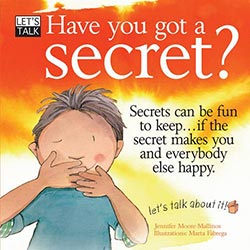Every child has secrets, and many secrets are fun to keep, for example a surprise birthday gift for mum, or a secret handshake with a friend. But sometimes, children have secrets that make them feel bad, such as a child who is being bullied might be inclined to keep it secret. Have you got a secret? helps children to understand that secrets that make them feel bad are best shared with their parents, or with some trusted older person.
Let’s Talk: Have you got a Secret?
 The situations explained in this book help children to distinguish between good and bad secrets and encourage communication between the child reader and an adult.
The situations explained in this book help children to distinguish between good and bad secrets and encourage communication between the child reader and an adult.
Author: Jennifer Moore-Mallinos
Illustrator: Marta Fabrega
Publisher: Book House
Things we liked:
Very well illustrated and carefully written in a manner that is accessible to children.
Worth noting:
This book covers situations where it is OK to keep a secret (for example, a surprise birthday party or a special handshake between friends). It also covers 'bad' or inappropriate secrets: the sort that make you feel 'unhappy inside' or worry a lot. Examples that are given include when someone hurts you, takes something from you or others, or touches you in a way that makes you feel uncomfortable. The book emphasises that you should not keep a bad secret just because someone tells you to, and how important it is to tell a trusted grown-up about it.

